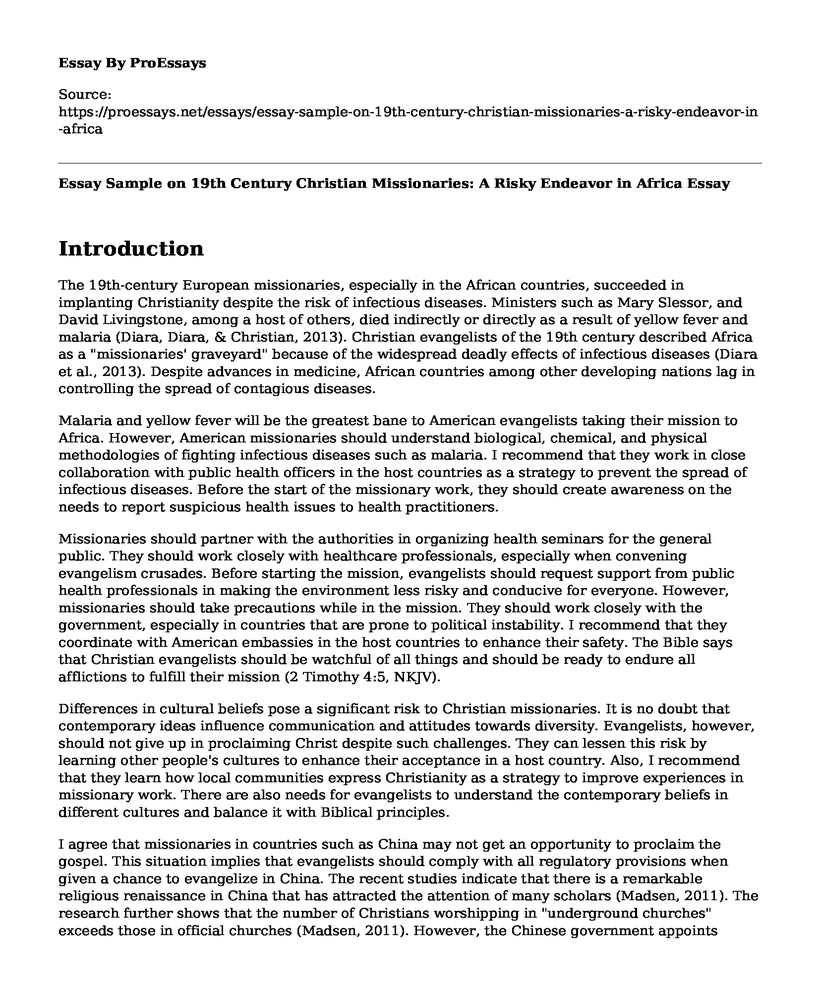Introduction
The 19th-century European missionaries, especially in the African countries, succeeded in implanting Christianity despite the risk of infectious diseases. Ministers such as Mary Slessor, and David Livingstone, among a host of others, died indirectly or directly as a result of yellow fever and malaria (Diara, Diara, & Christian, 2013). Christian evangelists of the 19th century described Africa as a "missionaries' graveyard" because of the widespread deadly effects of infectious diseases (Diara et al., 2013). Despite advances in medicine, African countries among other developing nations lag in controlling the spread of contagious diseases.
Malaria and yellow fever will be the greatest bane to American evangelists taking their mission to Africa. However, American missionaries should understand biological, chemical, and physical methodologies of fighting infectious diseases such as malaria. I recommend that they work in close collaboration with public health officers in the host countries as a strategy to prevent the spread of infectious diseases. Before the start of the missionary work, they should create awareness on the needs to report suspicious health issues to health practitioners.
Missionaries should partner with the authorities in organizing health seminars for the general public. They should work closely with healthcare professionals, especially when convening evangelism crusades. Before starting the mission, evangelists should request support from public health professionals in making the environment less risky and conducive for everyone. However, missionaries should take precautions while in the mission. They should work closely with the government, especially in countries that are prone to political instability. I recommend that they coordinate with American embassies in the host countries to enhance their safety. The Bible says that Christian evangelists should be watchful of all things and should be ready to endure all afflictions to fulfill their mission (2 Timothy 4:5, NKJV).
Differences in cultural beliefs pose a significant risk to Christian missionaries. It is no doubt that contemporary ideas influence communication and attitudes towards diversity. Evangelists, however, should not give up in proclaiming Christ despite such challenges. They can lessen this risk by learning other people's cultures to enhance their acceptance in a host country. Also, I recommend that they learn how local communities express Christianity as a strategy to improve experiences in missionary work. There are also needs for evangelists to understand the contemporary beliefs in different cultures and balance it with Biblical principles.
I agree that missionaries in countries such as China may not get an opportunity to proclaim the gospel. This situation implies that evangelists should comply with all regulatory provisions when given a chance to evangelize in China. The recent studies indicate that there is a remarkable religious renaissance in China that has attracted the attention of many scholars (Madsen, 2011). The research further shows that the number of Christians worshipping in "underground churches" exceeds those in official churches (Madsen, 2011). However, the Chinese government appoints patriotic associations to evangelize on its behalf.
Besides complying with all government rules and regulations, Christian missionaries should concentrate their efforts in smaller areas as a strategy to establish a strong foundation. They should also partner with official churches and do more intensive work in proclaiming the gospel. Biblical teachings are compatible with the Orient life of the Chinese and thus an opportunity to use the Old Testament to bring people closer to God. In Psalm 96:1-3 (NIV), the Bible says that Christians should declare the glory of God in all nations while mentioning His marvelous deeds to all people. Thus, missionaries should evangelize in all cultures since they have a responsibility to preach salvation.
References
Diara, B. C., Diara, J. C., & Christian, N. G. (2013). The 19th Century European Missionaries and the Fight Against Malaria in Africa. Mediterranean Journal of Social Sciences. DOI: 10.5901/mjss.2013.v4n16p89
Madsen, R. (2011). Religious Renaissance in China Today. Journal of Current Chinese Affairs, 40(2), 17-42. DOI: 10.1177/186810261104000202
Psalm 96: 1-3. Bible Gateway passage: Psalm 96:1-3 - New International Version. Retrieved July 31, 2019, from https://www.biblegateway.com/passage/?search=PSALMS+96%3A1-3&version=NIV/url/
2 Timothy 4:5. Bible Gateway passage: 2 Timothy 4:5 - New King James Version. Retrieved July 31, 2019, from https://www.biblegateway.com/passage/?search=2+Timothy+4%3A5&version=NKJV/url/
Cite this page
Essay Sample on 19th Century Christian Missionaries: A Risky Endeavor in Africa. (2023, Jan 31). Retrieved from https://proessays.net/essays/essay-sample-on-19th-century-christian-missionaries-a-risky-endeavor-in-africa
If you are the original author of this essay and no longer wish to have it published on the ProEssays website, please click below to request its removal:
- Essay Sample on Industrial Revolution: Impact on Modern Society
- Industrial Revolution in Latin America: Power Transfer, Resistance, and Revolt - Essay Sample
- Essay Example on Know the Oil in Your Life: A Guide for Understanding God's Presence
- Gnosticism: A Unique Perspective in Ancient Greek Religion - Essay Sample
- Essay Sample on British Colonization of the Americas: Challenges and Success
- Tim Cook: Journey from Auburn University to Apple CEO - Biography Sample
- All Quiet on the Western Front: Exploring the Experiences of Young Soldiers in WWI - Free Paper







